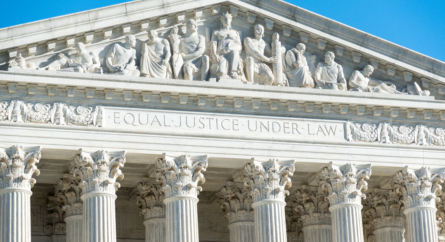Client Alert: Supreme Court Blocks Use of Race in College Admissions
Today, the U.S. Supreme Court ruled that use of race in college and university admissions violates the Equal Protection Clause of the 14th Amendment. The decision, Students for Fair Admissions vs. President and Fellows of Harvard College, examined the use of race in admissions processes used by Harvard and the University of North Carolina (UNC), and held that it did not hold up to the Constitutional strict scrutiny standard required for use of race in decisions by public educational entities and private entities that receive federal funding (under Title VI).
In order to survive strict scrutiny, Harvard and UNC would have had to show that their use of race in admissions decisions was narrowly tailored to achieve a compelling government interest, and that their processes did not use race as a negative factor or rely on racial stereotypes. The Court found that neither university met any aspect of this test. First, the Court held that the interests that both universities asserted the use of race was designed to achieve – including training future leaders, acquiring knowledge based on diverse outlooks, and creating a robust marketplace of ideas – while “commendable,” were not “sufficiently coherent” to be considered compelling. The Court further held that the means that the colleges were using to achieve their diversity-related goals were not narrowly tailored. The Court noted that the racial categories that colleges used were overbroad as to some identifiers, such as “Asian” or “Hispanic,” and did not include other potentially relevant identifiers, such as Middle Eastern.
The Court was critical of the universities’ reliance on precedent, which permitted the use of race when used only as a “plus factor” and not to detract from any one candidate’s application. The Court characterized college admissions as a “zero sum game,” where some applicants are necessarily admitted at the expense of others, and distinguished race from other permissible “plus factors,” writing, “The entire point of the Equal Protection Clause is that treating someone differently because of their skin color is not like treating them differently because they are from a city or from a suburb, or because they play the violin poorly or well.” Finally, the Court held that the use of race in admissions decisions amounted to an impermissible use of racial stereotypes, because it assumed that members of one race had the same perspectives or thought processes.
The Court left open the consideration of race in admissions only in very narrow circumstances. First, the Court agreed that students might discuss race in their application materials, by referencing how race or racial discrimination had impacted them as individuals. However, the Court cautioned colleges and universities against “simply establish[ing] through application essays or other means the regime we hold unlawful today,” meaning that a general question about how every student’s race impacted their life (which was suggested by the dissenting opinion) would likely not be permissible. The Court also noted precedent which would allow institutions to consider race as a remedial measure towards specific past discrimination by that institution. This option is likely not available to many colleges or universities, as they would be required, under strict scrutiny, to identify specific previous discrimination that the institution engaged in, and to show that consideration of race was necessary to remedy that discrimination.
Institutions are encouraged to contact their employment and labor attorney at Bowditch if they have any questions or concerns about this issue.
Don’t miss our webinar “Breaking Down the Supreme Court’s Block on Race-Based Affirmative Action in College Admissions” on July 12. Register now!
Categorized: Client Alerts, Publications
Tagged In: diversity, affirmative action, race-based admissions, Equal Protection Clause






